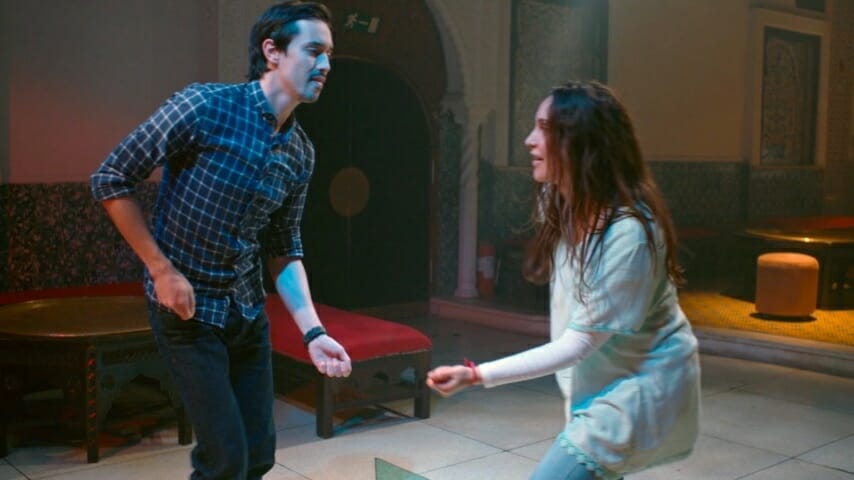
I have a soft spot for ensemble dramas like Short Cuts and Magnolia. By digging into the lives of otherwise unconnected characters who interact briefly before moving onto their own stories, they act as social equalizers, reminding the audience of commonality of the human experience. You may only know the barista who serves your morning latte as the barista who serves your morning latte, but he might be going through personal issues similar to the ones you’re tackling. The woman who rear-ends you in traffic might be harboring a past trauma she grapples with on a daily basis, but to you she only represent a transactional argument. Despite our class, gender, or cultural differences, our hopes, our aspirations and our regrets are universal. Sometimes art has to remind us of this basic fact.
Until the Birds Return, a tender and empathy-driven drama from Algiers, focuses on our common regrets, and how we can move on after the wrong choices we make. Instead of intercutting between the tangentially connected characters, co-writer/director Karim Moussaoi adopts an anthology structure. After one character’s story is over, he leads his camera to follow the person they shared a quick, impersonal moment with. The switch in narrative is so seamless and organic, the camera a fly on the wall that just happens to attach itself to the next random individual.
We begin with Mourad (Mohamed Djouhri), a soft-spoken, middle-aged property developer whose indecisiveness is fueling the family’s resentment against him. His ex-wife, Nacim (Zineddine Hamdouche), wants him to set their slacker college-age son straight. His current wife, Rasha (Aure Atika), wants to move back to France after being unemployed for years, and is looking for Mourad to pull the trigger so they can get a divorce. Mourad gets a sobering reminder of his destructive idleness when he witnesses two thugs beating a man to a pulp. Frozen with fear, Mourad escapes the scene, not even bothering to call the police. The next day, his guilt pushes him to get information about the victim’s situation. His journey leads him to a reckoning with his willful ignorance towards his family.
A seemingly inconsequential scene where Mourad argues with his company’s driver, Djalil (Mehdi Ramdani), who wants to take a couple of days off of work during the busy season to drive a friend’s daughter to her wedding, glides us into the next story. During a large chunk of this section, Moussaoi focuses on the silent moments between Djalil and Aicha (Hania Amar), the bride-to-be. The lengthy looks between them strongly implies a romantic past between the two. With their doggedly internal nature, these scenes give us volumes of insight into a complex past. Ramdani and Amar’s spot-on performances that find just the right amount of expressiveness to get the point across, but refrains from any melodramatic touches, heavily support this section.
On the way to the wedding, Aicha’s father helps a man whose car has stalled on the side of the road. That man is renowned neurosurgeon Dahman (Hassan Kachach), who’s a couple of days away from marrying a beautiful woman. Dahman’s happiness comes crashing down when a local poor woman accuses him of a despicable act during the civil war. At first, Dahman uses his class privilege to dismiss the woman’s accusations, and her request for a simple favor that stems from it, but his guilt becomes increasingly unbearable during his wedding. By the time he decides to act on the situation as a desperate attempt to bypass a life of regret, he might be too late.
Screenwriters Moussaoi and Maud Ameline’s almost aggressive denial in giving the audience any clear closure is refreshing, and fits the film’s themes. They follow this motif to extreme ends, going so far as interrupting the narrative with a musical number the moment there’s a hint of an emotional and soulful resolution between two characters. No matter the outcome, these people will have to continue living with the decisions they made, and the haunting memories that will follow.
The slow pacing, more than likely implemented to integrate ourselves into the characters’ lives, goes a bit too far at times. There are moments that show character doings mundane things in real life, like a slightly less drawn-out take on Jeanne Dielman, Chantal Akerman’s legendary four-hour experimental drama about a woman’s day-to-day routine. Moussaoi also lingers on establishing shots of cars driving on highways and reaching their destinations, perhaps as a reminder that all those people in the other cars must have similar stories of their own.
The abrupt way he finishes his film certainly supports this philosophy: There are millions more tales like this in the world; the film just runs out of time to tell them. Over all, the profound performances, the even-lit digital cinematography that gives the film a docudrama feel, and Moussaoi’s impressive voice as a first-time feature helmer turns Until the Birds Return into an engaging work on the universality of human nature.
Director: Karim Moussaoi
Writers: Karim Moussaoi, Maud Ameline
Starring: Mohamed Djouhri, Zineddine Hamdouche, Aure Atika, Mehdi Ramdani, Hania Amar, Hassan Kachach
Release Date: April 28, 2020
Oktay Ege Kozak is a screenwriter, script coach and film critic. He lives near Portland, Ore., with his wife, daughter, and two King Charles Spaniels.